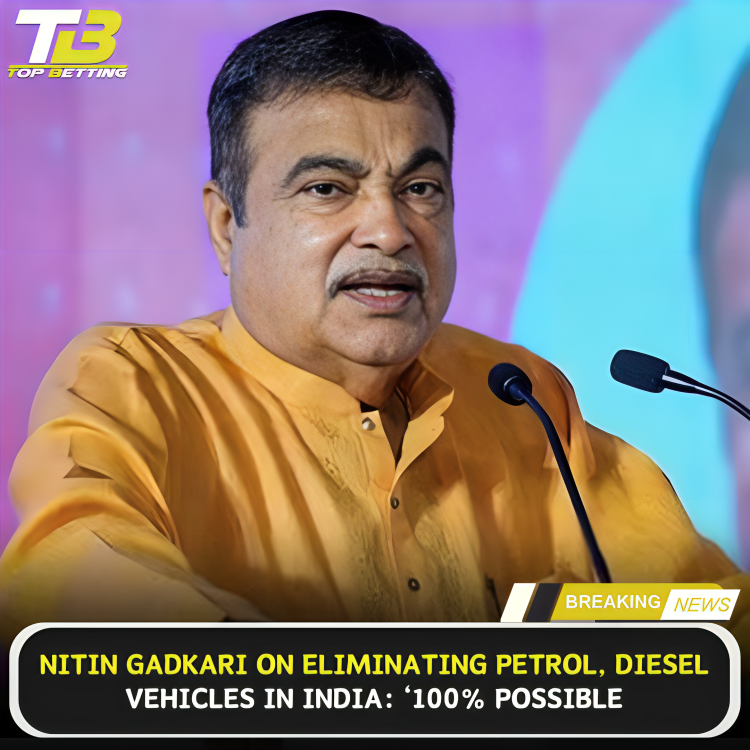
Nitin on eliminating petrol diesel vehicles
In a significant statement, Nitin Gadkari, the Union Minister for Road Transport and Highways, expressed confidence in India’s ability to transition away from petrol and diesel vehicles entirely. Emphasizing the urgency of adopting sustainable alternatives, Gadkari outlined ambitious plans and strategies aimed at achieving this goal. His remarks underscore the government’s commitment to addressing environmental concerns, reducing dependency on fossil fuels, and promoting cleaner, greener transportation solutions.
Nitin Gadkari said he has been pushing for alternative fuels since 2004 and is confident things will change in the coming five to seven years.
Union minister Nitin Gadkari said that his aim is to get rid of petrol and diesel cars altogether in India to make the country a green economy. When asked about whether it is possible for India to eliminate petrol and diesel cars completely, he told news agency PTI, “One hundred per cent. It is difficult but not impossible. This is my vision.”
India spends ₹16 lakh crore on fuel imports and this money can be used for improving the life of farmers, villages will be prosperous and the youth will get employment, he told PTI.
Proposal on hybrids sent to finance ministry
The proposal to reduce GST on hybrid vehicles to five per cent and to 12 per cent for flex engines has been sent to the Finance ministry, the minister said asserting that the country can end fuel import by promoting the use of biofuels.
Pitching since 2004
Nitin Gadkari said he has been pushing for alternative fuels since 2004 and is confident things will change in the coming five to seven years. He said, “I cannot give you a date and year for this transformation to take place as it is very difficult. This is difficult but not impossible.”
He said he firmly believes that given the speed with which electric vehicles are being introduced, the coming era will be of alternative and biofuels and this dream will come true.
Nitin Gadkari says: ‘I roam around in a car that runs on hydrogen.’
Auto companies such as Bajaj, TVS and Hero are also planning to manufacture motorcycles using flex engines, he said, adding, “I roam around in a car that runs on hydrogen. You can see electric cars in every other household. People who used to say this was impossible, have changed their views now and started believing in what I have been saying for the last 20 years.”
“Tatas and Ashok Leyland have introduced trucks that run on hydrogen. There are trucks that run on LNG/CNG. There are 350 factories across the country of bio-CNG,” he said, asserting, “Definitely, a revolution is taking place. The fuel imports will end and this country will become self-reliant – Atmanirbhar Bharat. I strongly believe in this.”
Urgency of Transition:
Nitin Gadkari’s assertion comes amidst growing global concerns over climate change, air pollution, and depleting fossil fuel reserves. The transportation sector, particularly vehicles powered by petrol and diesel engines, is a significant contributor to these challenges. Recognizing the need for immediate action, Gadkari stressed the importance of transitioning to cleaner, renewable energy sources to mitigate the adverse impacts of vehicular emissions on public health and the environment.
Vision for Sustainable Mobility:
Gadkari outlined a comprehensive vision for sustainable mobility in India, focusing on innovation, technology, and policy interventions to drive the transition towards electric and alternative fuel vehicles. This vision encompasses multiple initiatives, including:
Promotion of Electric Vehicles (EVs): The government has rolled out various incentives and subsidies to encourage the adoption of electric vehicles, including reduced GST rates, tax exemptions, and financial incentives for EV buyers. Gadkari reiterated the government’s commitment to expanding the EV infrastructure, including charging stations and battery-swapping facilities, to address range anxiety and facilitate widespread adoption.
Development of Alternative Fuels: In addition to electric vehicles, Gadkari emphasized the importance of exploring alternative fuel options such as biofuels, hydrogen, and compressed natural gas (CNG). By diversifying the fuel mix, India can reduce its reliance on imported crude oil and lower carbon emissions from the transportation sector.
Investment in Infrastructure: To support the transition to cleaner transportation, Gadkari underscored the need for significant investments in infrastructure development, including road networks, public transportation systems, and charging infrastructure for electric vehicles. Public-private partnerships and innovative financing models are being explored to mobilize investments and accelerate infrastructure deployment.
Policy Reforms: Gadkari highlighted the government’s efforts to streamline regulatory frameworks, facilitate ease of doing business, and incentivize research and development in the automotive sector. Policy reforms aimed at promoting domestic manufacturing of electric vehicles, batteries, and related components are crucial for building a robust ecosystem for sustainable mobility.
Challenges and Opportunities:
While the vision of eliminating petrol and diesel vehicles presents formidable challenges, it also offers immense opportunities for India to lead the global transition towards sustainable transportation. The transition to electric and alternative fuel vehicles has the potential to create new job opportunities, reduce import dependency, and position India as a pioneer in clean energy technologies.
Conclusion:

Nitin Gadkari’s assertion that it is ‘100% possible’ to eliminate petrol and diesel vehicles in India reflects the government’s unwavering commitment to promoting sustainable mobility and combating climate change. By embracing innovation, technology, and progressive policies, India can chart a path towards a cleaner, greener future for its transportation sector, contributing to global efforts to address the existential threat of climate change. As the nation accelerates its transition to electric and alternative fuel vehicles, collaborative efforts from government, industry, and civil society will be essential to realizing this ambitious vision.










